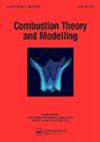A thick reaction zone model for premixed flames in two-dimensional channels
IF 1.6
4区 工程技术
Q4 ENERGY & FUELS
引用次数: 4
Abstract
Direct interactions between the flow field and the chemical reaction in premixed flames occur when the reaction zone thickness is comparable to, or greater than flow length scales. To study such interactions, a laminar model is considered that has direct bearings to steadily propagating deflagrations in a Hele-Shaw channel with a background plane Poiseuille flow. The study employs asymptotic analyses, pertaining to large activation energy and lubrication theories and considers a distinguished limit where the channel width is comparable to the reaction zone thickness, with account being taken of thermal-expansion and heat-loss effects. The reaction zone structure and burning rates depend on three parameters, namely, the Peclet number, , the Lewis number, and the ratio of channel half-width to reaction zone thickness, . In particular, when the parameter is small wherein the reaction zone is thick, transport processes are found to be controlled by Taylor's dispersion mechanism and an explicit formula for the effective burning speed is obtained. The formula indicates that for , which interestingly coincides with a recent experimental prediction of the turbulent flame speed in a highly turbulent jet flame. The results suggest that the role played by differential diffusion effects is significant both in the laminar and turbulent cases. The reason for the peculiar dependence can be attributed, at least in our laminar model, to Taylor dispersion. Presumably, this dependence may be attributed to a similar but more general mechanism in the turbulent distributed reaction zone regime, rather than to diffusive-thermal curvature effects. The latter effects play however an important role in determining the effective propagation speed for thinner reaction zones, in particular, when is large in our model. It is found that the magnitude of heat losses at extinction, which directly affects the mixture flammability limits, is multiplied by a factor in comparison with those corresponding to the no-flow case in narrow channels.二维通道中预混火焰的厚反应区模型
当反应区厚度与流动长度尺度相当或大于流动长度尺度时,预混合火焰中的流场和化学反应之间会发生直接相互作用。为了研究这种相互作用,考虑了一个层流模型,该模型与具有背景平面Poiseuille流的Hele-Shaw通道中稳定传播的爆燃有直接关系。该研究采用了与大活化能和润滑理论有关的渐近分析,并考虑了通道宽度与反应区厚度相当的区别极限,同时考虑了热膨胀和热损失效应。反应区的结构和燃烧速率取决于三个参数,即Peclet数、Lewis数和通道半宽与反应区厚度之比。特别地,当反应区较厚的参数较小时,发现传输过程受泰勒分散机制控制,并获得了有效燃烧速度的显式公式。该公式表明,对于,有趣的是,这与最近对高湍流射流火焰中湍流火焰速度的实验预测相吻合。结果表明,微分扩散效应在层流和湍流情况下都起着重要作用。这种特殊依赖性的原因可以归因于泰勒色散,至少在我们的层流模型中是这样。据推测,这种依赖性可能归因于湍流分布反应区区域中类似但更普遍的机制,而不是扩散热曲率效应。然而,后一种效应在确定较薄反应区的有效传播速度方面起着重要作用,特别是在我们的模型中较大时。研究发现,与狭窄通道中无流动情况下的热损失相比,直接影响混合物可燃性极限的消光热损失幅度乘以一个因子。
本文章由计算机程序翻译,如有差异,请以英文原文为准。
求助全文
约1分钟内获得全文
求助全文
来源期刊

Combustion Theory and Modelling
工程技术-工程:化工
CiteScore
3.00
自引率
7.70%
发文量
38
审稿时长
6 months
期刊介绍:
Combustion Theory and Modelling is a leading international journal devoted to the application of mathematical modelling, numerical simulation and experimental techniques to the study of combustion. Articles can cover a wide range of topics, such as: premixed laminar flames, laminar diffusion flames, turbulent combustion, fires, chemical kinetics, pollutant formation, microgravity, materials synthesis, chemical vapour deposition, catalysis, droplet and spray combustion, detonation dynamics, thermal explosions, ignition, energetic materials and propellants, burners and engine combustion. A diverse spectrum of mathematical methods may also be used, including large scale numerical simulation, hybrid computational schemes, front tracking, adaptive mesh refinement, optimized parallel computation, asymptotic methods and singular perturbation techniques, bifurcation theory, optimization methods, dynamical systems theory, cellular automata and discrete methods and probabilistic and statistical methods. Experimental studies that employ intrusive or nonintrusive diagnostics and are published in the Journal should be closely related to theoretical issues, by highlighting fundamental theoretical questions or by providing a sound basis for comparison with theory.
 求助内容:
求助内容: 应助结果提醒方式:
应助结果提醒方式:


